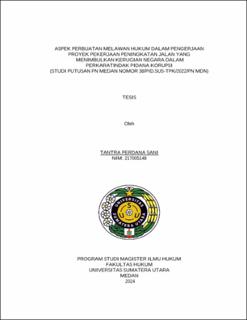| dc.description.abstract | The Indonesian government itself, in its efforts to eradicate corruption, has refined the Law on Corruption Eradication and established the Corruption Eradication Commission to support law enforcement. The government has enacted Law Number 31 of 1999 concerning the Eradication of Criminal Acts of Corruption, as amended by Law Number 20 of 2001 concerning Amendments to Law Number 31 of 1999 concerning the Eradication of Criminal Acts of Corruption. Therefore, it is important to examine unlawful acts in corruption cases. This research aims to analyze unlawful acts in corruption cases that result in state losses in corruption cases, analyze the evidence of corruption in Medan District Court Decision Number 38/Pid.Sus-TPK/2022/PN Mdn, and analyze the road improvement project that resulted in state losses in corruption cases in Medan District Court Decision Number 38/Pid.Sus-TPK/2022/PN Mdn.
The research method used is normative juridical research, supported by primary and secondary data sources. All legal materials were collected using library research techniques using document study as a data collection tool. Qualitative analysis was conducted.
In eradicating corruption, particularly in the application of the unlawful element, it is necessary to prove whether an unlawful act has occurred, including a violation of statutory regulations or a failure to implement statutory regulations, which could potentially result in state financial losses. In this study, the defendant violated Government Regulation Number 58 of 2005 concerning Regional Financial Management, Presidential Regulation Number 54 of 2010 concerning Government Procurement of Goods/Services and its amendments, and Minister of Home Affairs Regulation Number 13 of 2006 as amended by Minister of Home Affairs Regulation Number 21 of 2011 concerning the Second Amendment to Minister of Home Affairs Regulation Number 13 of 2016 concerning Guidelines for Regional Financial Management. The state loss was Rp 1,173,762,681.06. | en_US |


